Featured Results
Featured results highlight specific search outcomes, customizable via keywords or images, managed in the Dashboard.
Featured Results are a powerful feature designed to highlight specific search results on your search page, ensuring key content is prominently displayed for users.
- Targeted Highlighting: When users search for specific words or phrases, relevant links are prominently displayed at the top of the results page for enhanced visibility.
- Keyword Customization: Keywords for Featured Results can either be automatically extracted from the highlighted link or manually customized to align with your search strategy.
- Image-Based Results: In addition to text-based results, SearchBlox supports image-based Featured Results, which function similarly to banner ads, providing a visually engaging way to showcase important content.
The creation, configuration, and display of Featured Results can be easily managed through the SearchBlox Dashboard. Navigate to Dashboard -> Collections -> Featured Results to set up and customize this feature according to your needs.
Featured Results Dashboard
When creating Featured Results, users can perform the following actions:
- Save: Save the current configuration without activating it.
- Save and Activate: Save the configuration and immediately activate the Featured Result.
- Preview Result: View a preview of how the Featured Result will appear on the search page.
- Cancel: Discard any changes and exit the creation process.
Once activated, the Featured Results can be viewed by navigating to the Featured Results tab within the Featured Results section.

Featured Results Dashboard Functionality
The Featured Results Dashboard provides a comprehensive set of tools to manage and optimize your Featured Results. Key actions include:
- Create Featured Results: Set up new Featured Results with customized keywords, links, and images.
- Preview Created Featured Results: View a preview of how the Featured Result will display on the search page.
- Edit Featured Results: Modify existing Featured Results by clicking on the Title of the result.
- Filter Featured Results: Narrow down results by filtering based on Collections, Title, or Keywords.
- Import and Export Featured Results: Easily import or export Featured Results for bulk updates or sharing across systems.
- Delete Single Featured Result: Remove an individual Featured Result as needed.
- Delete Selected Featured Results: Bulk delete multiple Featured Results simultaneously.
- Refresh Featured Results Page: Update the page to reflect any changes made during operations.

- Results can be previewed and deactivated from the dashboard. By clicking preview, the result will appear as follows:

Types of Featured Results
Featured Results in SearchBlox can be categorized into two distinct types, each designed to cater to different content presentation needs:
- Text-Based Featured Results:
- Display only text content within the featured result.
- Ideal for highlighting concise information, links, or textual descriptions.
- Graphics-Based Featured Results:
- Incorporate images or visual elements, similar to banner ads.
- Perfect for showcasing visually engaging content, such as promotional banners or product images.
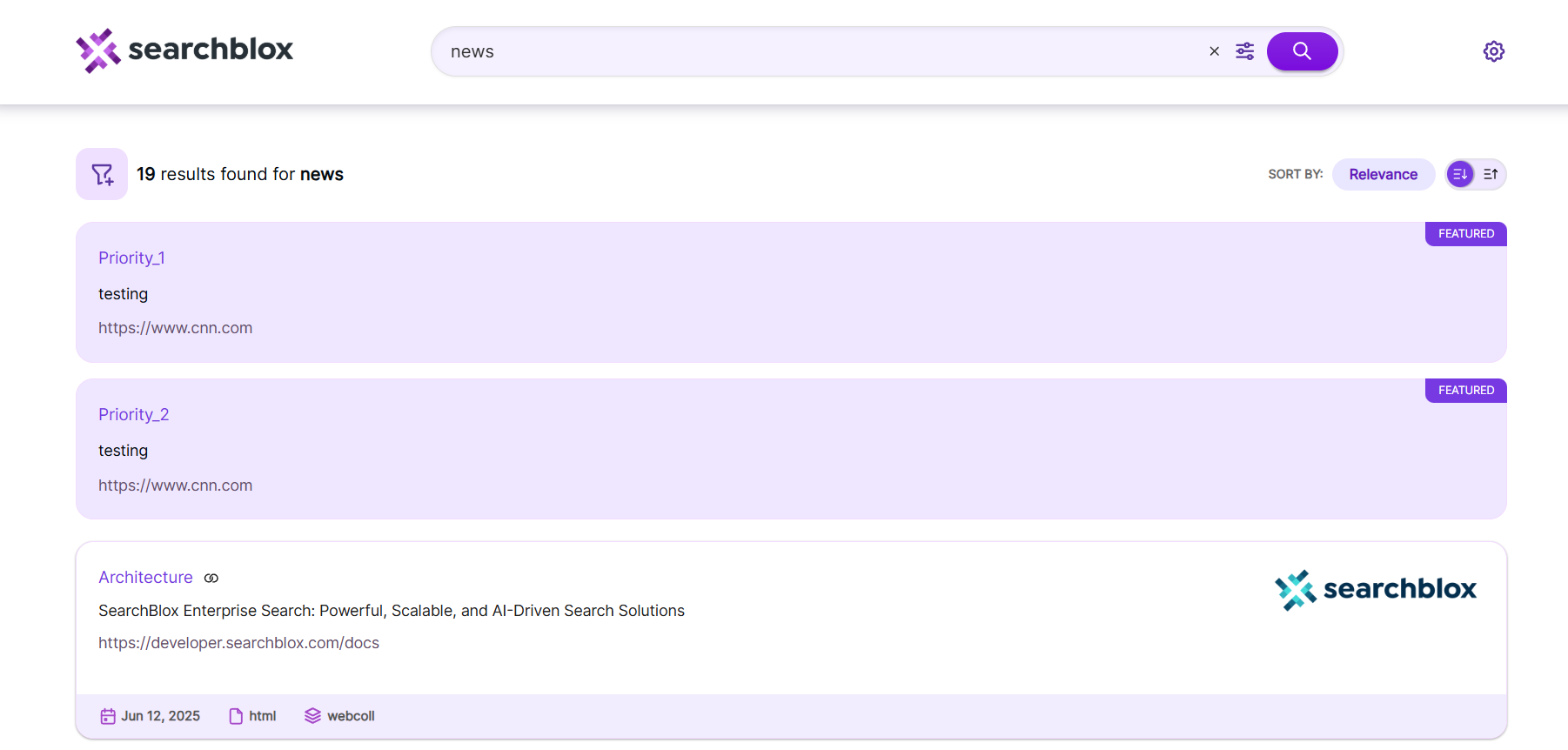
Creating Featured Results
To create Featured Results in SearchBlox, follow these step-by-step instructions:
- Log in to the Admin Console:
Access the SearchBlox Admin Console using your credentials. - Navigate to Collections:
From the dashboard, click on Collections. - Select the Featured Results Tab:
Within the Collections section, locate and select the Featured Results tab. - Initiate Creation:
Click on Create Featured Result or the "+" icon to begin the process. - Provide Required Details:
Fill in the necessary fields, including:- Type: Choose between text-based or graphics-based.
- Title: Enter a title for the Featured Result.
- Description: Add a brief description (if applicable).
- URL: Specify the destination link.
- Keywords: Add relevant keywords for triggering the result.
- Keywords Type: Select the type of keyword matching (e.g., exact or partial).
- Collections: Assign the result to the appropriate collection(s).
- Date: Include a date if applicable (e.g., for time-sensitive content).
- Complete any additional fields as required.
- Save and Activate:
Click Save and Activate to finalize and activate the Featured Result.
By following these steps, you can efficiently create and deploy Featured Results to enhance your search functionality and user experience.
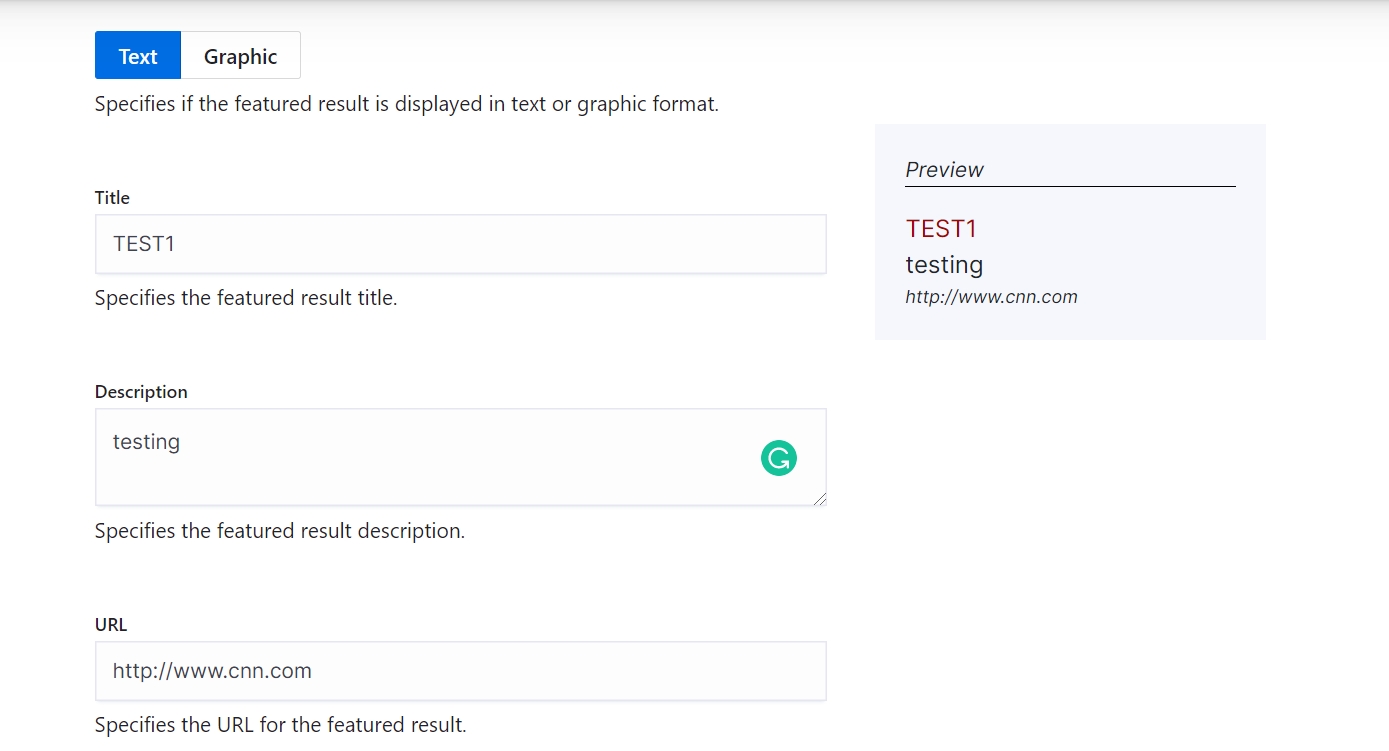
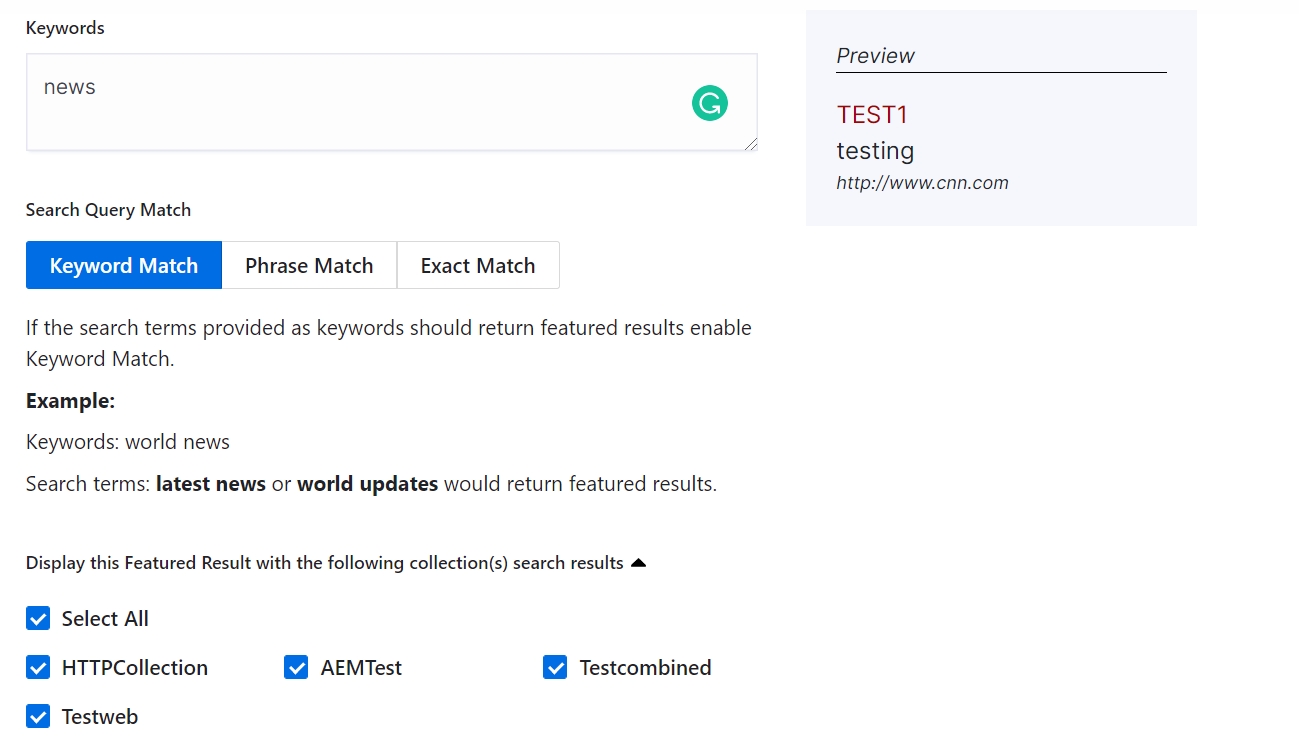
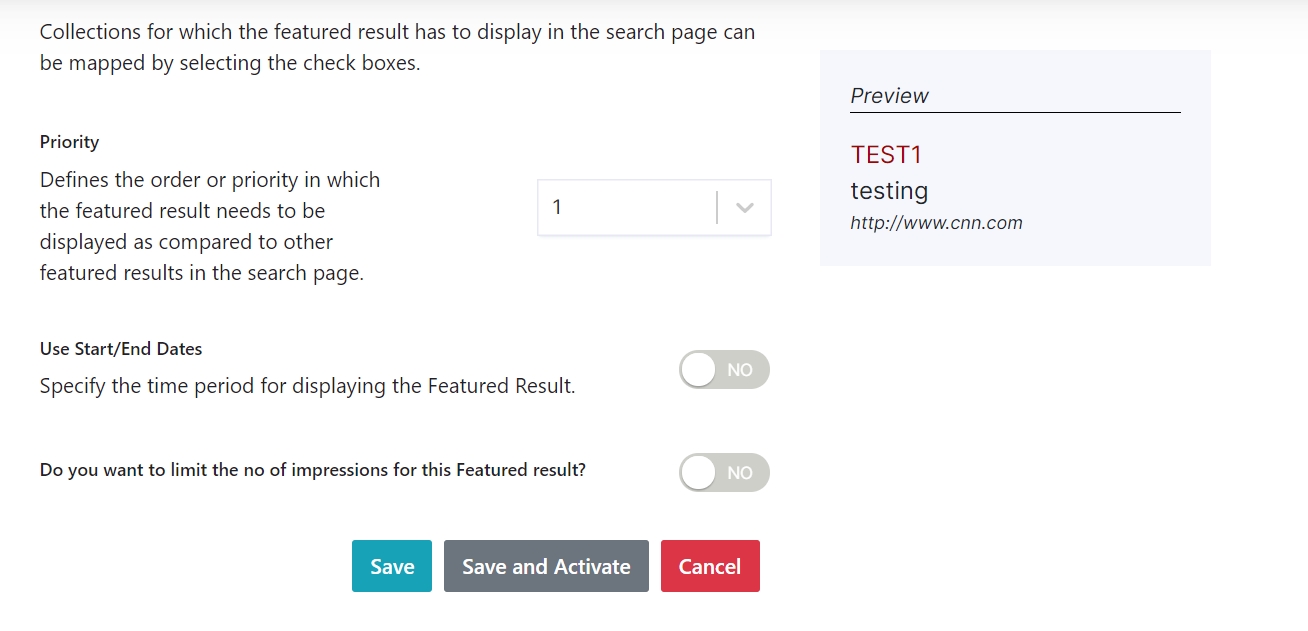
Settings in Featured Results
| Setting | Description |
|---|---|
| Type | Specifies whether the featured result has to be displayed in text or graphic format. |
| Title | Specifies the title to be displayed in the featured result. The title limit is Max. 256 characters. |
| Description | Specifies the description to be displayed in the featured result. The description limit is Max. 256 characters. |
| URL | URL of the featured result. |
| Keyword Content | Specifies whether keywords are explicitly specified, or to be fetched from the URL. |
| Keywords | Keywords specified explicitly by the user for featured results display. The keywords limit is Max. 256 characters. |
| Keyword Match | If each word provided as keywords can be considered for featured results display then this option has to be checked Example: Keywords: test world Search terms: this is a test test now would give featured results |
| Phrase Match | If the terms are to be considered as a phrase match for featured results display then this option has to checked Example: Keywords: test world Search terms: this is test world test world good would give featured results test is world should not give featured results |
| Exact Match | If the exact term or phrase has to be considered for featured results display then this option has to be checked Example: Keywords: test world Search terms: test world would give featured results no other search term with test or world would give results |
| Keywords URL | URL of the webpage from which the keywords will be considered for featured results display. |
| Collections | Collections for which the results have to display can be selected by checking the check box |
| Use Start/End date | Yes/no radio buttons determine whether to use a start/end date or not. |
| Start date | Date from which the featured result has to appear in search results. |
| Expiry date | Date until which the featured result has to appear in the search results. |
| No. of times to display | Number of times the feature has to be displayed in the search results. |
| Priority | The order or priority in which the feature needs to be displayed among other search results. |
| Graphic URL | The image URL to be displayed in the ad. |
Configuring Priority for Featured Results
When creating Featured Results, you can configure the display order by assigning a priority value. This ensures that the most important results are displayed prominently. Here’s how priority works:
- Priority Field:
While creating a Featured Result, specify a numerical value in the Priority field to determine its display order. - Precedence Rules:
The Featured Result with Priority 1 has the highest precedence and will be displayed at the top of the results.
Lower numerical values indicate higher precedence. For example, a Featured Result with Priority 2 will appear below one with Priority 1.
Example:
If two Featured Results are assigned priorities 1 and 2, the result with Priority 1 will be displayed first, followed by the result with Priority 2.
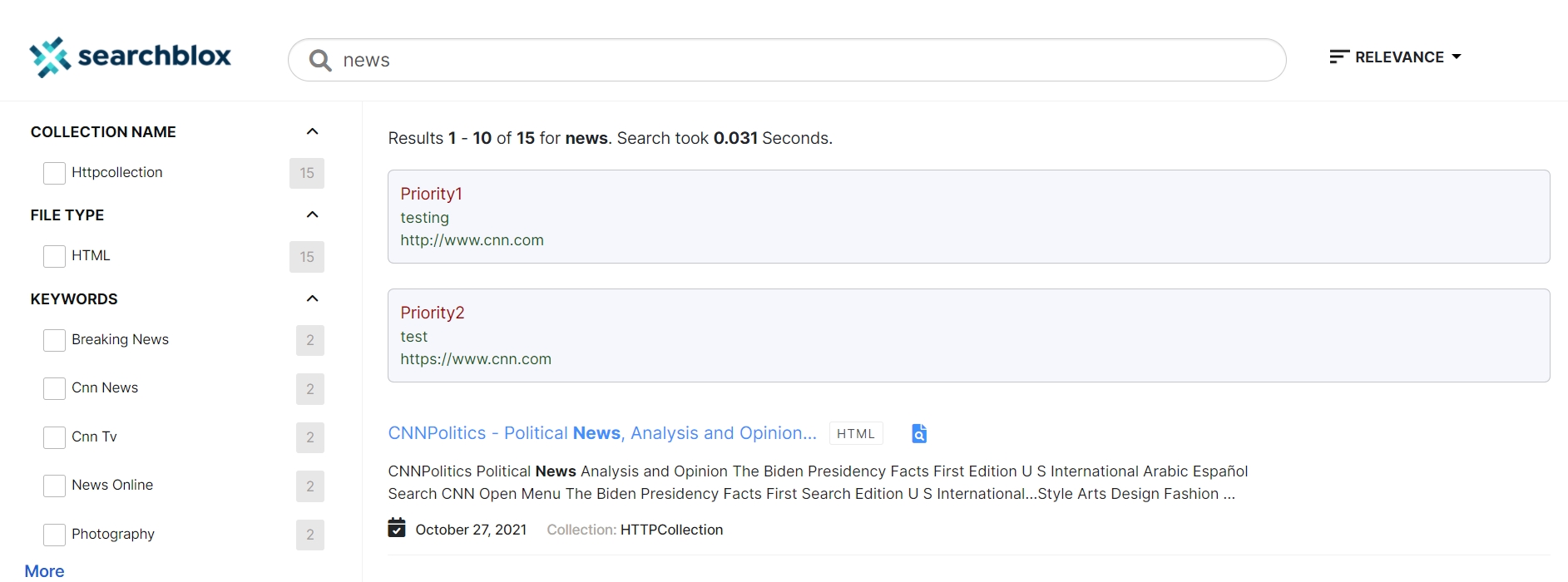
Keywords for Featured Results Display
Keywords entered in the Keywords field act as triggers for displaying Featured Results. When a user’s search query matches these keywords, the corresponding Featured Result is prominently displayed.
Instructions on keywords for Featured Results:
Keywords are essential for triggering the display of Featured Results in search queries. Proper formatting and selection of keyword types ensure accurate and effective results.
Keyword Formatting:
Separator: Keywords must be separated by either a comma ( , ) or a space ( ).
Best Practice: Avoid using new lines to separate keywords, as this can cause issues during the export of Featured Results.
Keyword Types:
Keywords for Featured Results can be configured using one of the following Keyword Types:
- Keyword Match:
The Featured Result is displayed if any of the specified keywords are present in the user’s search query.
Example: Keywords = "apple, fruit"
Search Query: "I love apple" → Featured Result displayed.
Search Query: "Fruit salad" → Featured Result displayed. - Phrase Match:
The Featured Result is displayed only if the exact phrase (or a close variation) is present in the search query.
Example: Keywords = "red apple"
Search Query: "I bought a red apple" → Featured Result displayed.
Search Query: "apple is red" → Featured Result not displayed. - Exact Match:
The Featured Result is displayed only if the search query exactly matches the specified keyword.
Example: Keywords = "apple"
Search Query: "apple" → Featured Result displayed.
Search Query: "red apple" → Featured Result not displayed.
- Use Keyword Match for broader matching (any keyword in the query).
Use Phrase Match for specific phrases or close variations.
Use Exact Match for precise, word-for-word matching.
By carefully selecting and formatting keywords, you can ensure that Featured Results are displayed accurately and effectively, improving search relevance and user experience.
- The examples for the above keyword types are given in the following table:
| Keyword Type | Keywords | Search Term & Results |
|---|---|---|
| Keywords Match | test world | this is a test test now would display featured results |
| Phrase Match | test world | this is test world test world good would display featured results test is world should not display featured results |
| Exact Match | test world | Only test world should display featured results |
Additional Details on Keywords for Featured Results
Here are some important considerations and rules for using keywords in Featured Results:
- Using a URL as a Keyword Source:
If a URL is provided in the Keyword URL field, the keywords from that webpage’s metadata (e.g., ) will be extracted and used for triggering Featured Results.
Separators: Both spaces and commas in the webpage’s meta keywords are treated as separators.
Example:
If the meta keywords on a webpage are: Featured Results will be triggered for individual words like: `"business" "consulting" "application" "development" "management"` - Synonyms and Keyword Variations:
Featured Results do not support synonyms automatically.
All possible variations of a keyword must be explicitly listed in the Keywords field.
Example:
If you want Featured Results to appear for variations of "email," you must include:
"email" "e-mail" "e mail" - Keyword Extraction from Webpages:
When using a Keyword URL, the system extracts individual words from phrases in the meta keywords.
This means that even if the meta keywords are phrases (e.g., "business consulting"), Featured Results will be triggered for individual words (e.g., "business" or "consulting").
Collection based Featured Results
Featured Results can be configured to display based on the collections selected during their creation. This ensures that the results are contextually relevant and aligned with the content being searched.
How Collection-Based Featured Results Work:
- Collection Selection:
When creating a Featured Result, you can associate it with one or more collections.
These collections represent specific sets of content (e.g., knowledge base articles, product pages, customer portal content). - Display Logic:
The Featured Result will only be displayed if the selected collection(s) are being searched.
For example:
If Collection 1 is enabled in the Featured Result, and the user searches within Collection 1 (either alone or alongside other collections), the Featured Result will be displayed (provided the keywords match).
If the user searches in a collection not associated with the Featured Result, it will not be displayed.
Example:
Featured Result Configuration:
Keywords: "product support"
Collections: Collection 1 (Knowledge Base)
User Search:
Searches within Collection 1 for "product support" → Featured Result is displayed.
Searches within Collection 2 (Product Pages) for "product support" → Featured Result is not displayed.
Importing and Exporting Featured Results
Featured Results can be easily imported and exported to streamline management and bulk updates.
Exporting Featured Results:
- Access the Export Option:
Navigate to the Featured Results Dashboard.
Click the Export button located in the top right-hand corner of the dashboard. - Download Featured Results:
Upon clicking Export, a CSV file containing the list of all Featured Results will be downloaded.
Refer to the provided screenshot for an example of the exported file format. - Purpose of Export:
Exporting Featured Results allows you to:
Review the current configuration.
Use the file as a template for bulk imports.
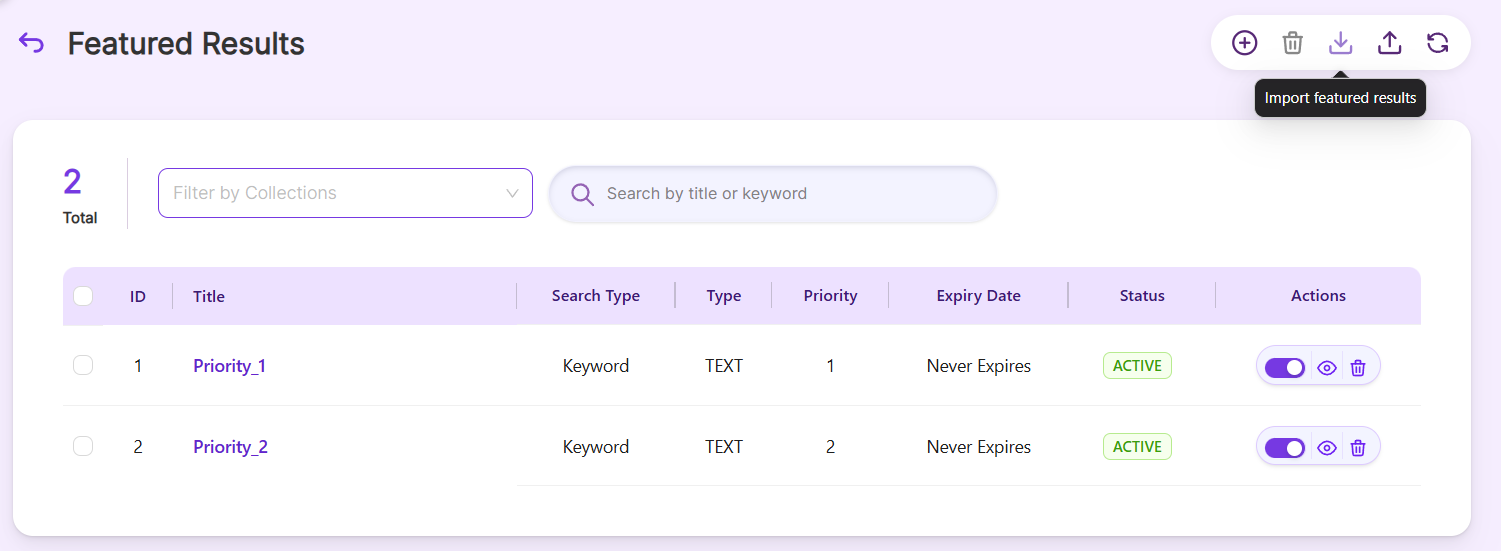
Importing Featured Results:
- Access the Import Option:
In the Featured Results Dashboard, click the Import button located in the top right-hand corner. - Upload the CSV File:
After clicking Import, upload the CSV file containing the new or updated Featured Results.
Refer to the provided screenshot for an example of the upload process.
Once uploaded, the Featured Results in the CSV file will be processed and activated in bulk. - File Format Requirements:
The uploaded file must be in the CSV format supported by SearchBlox.
To ensure the correct format, create a sample Featured Result, export it, and use the exported file as a template.
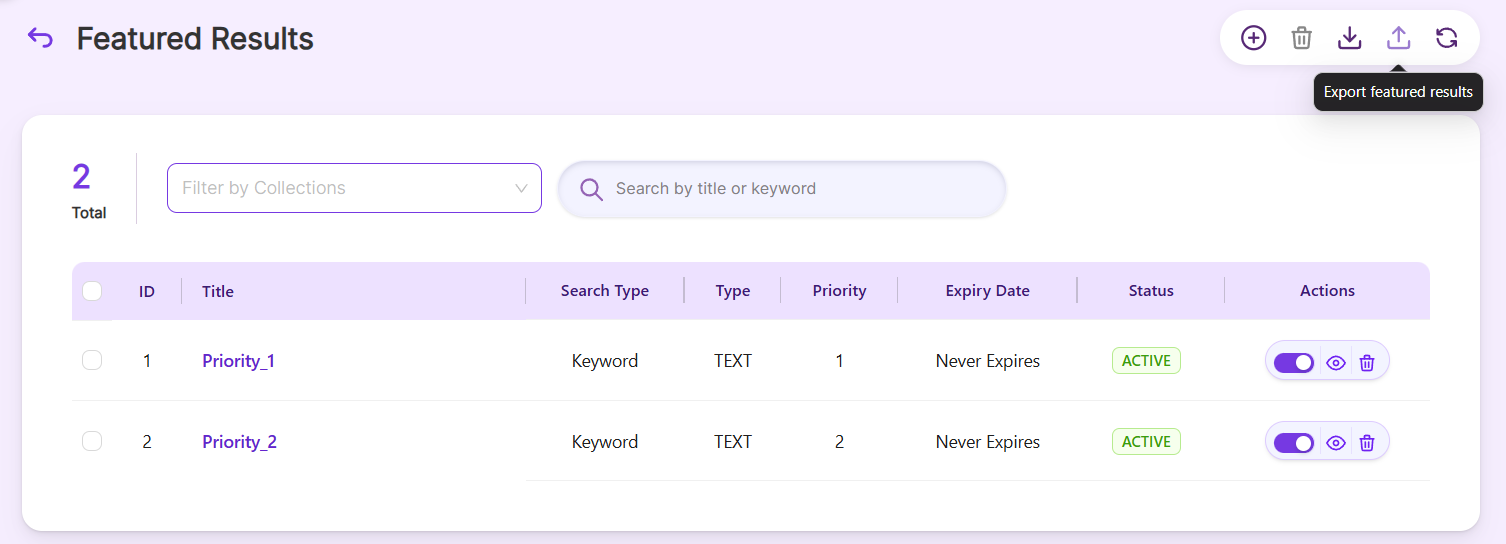
By leveraging the Import and Export features, you can easily manage, update, and scale your Featured Results configuration.
General Instructions
To ensure the proper configuration and functionality of Featured Results, follow these general guidelines:
- Keywords from URL:
When selecting the Keywords URL content type, the keywords from the specified webpage’s metadata (e.g., ) will be extracted and used for triggering Featured Results. - Display Frequency:
The No. of times to display setting applies only to regular search results and does not affect Featured Results. - Start Date for Display:
Ensure that the start date specified for Featured Results is less than the current date.
Featured Results will not display if the start date is in the future. - Keyword Types:
For Exact Match and Phrase Match keyword types, provide only one term or phrase in the keywords field.
Exact Match: Requires the search query to exactly match the specified keyword.
Phrase Match: Requires the search query to contain the exact phrase or a close variation. - Collection-Based Display:
Featured Results will only be displayed if the selected collection(s) in the Featured Results configuration are also enabled and being searched.
If the collection is not enabled or not part of the search, the Featured Result will not appear.
Updated 6 months ago
